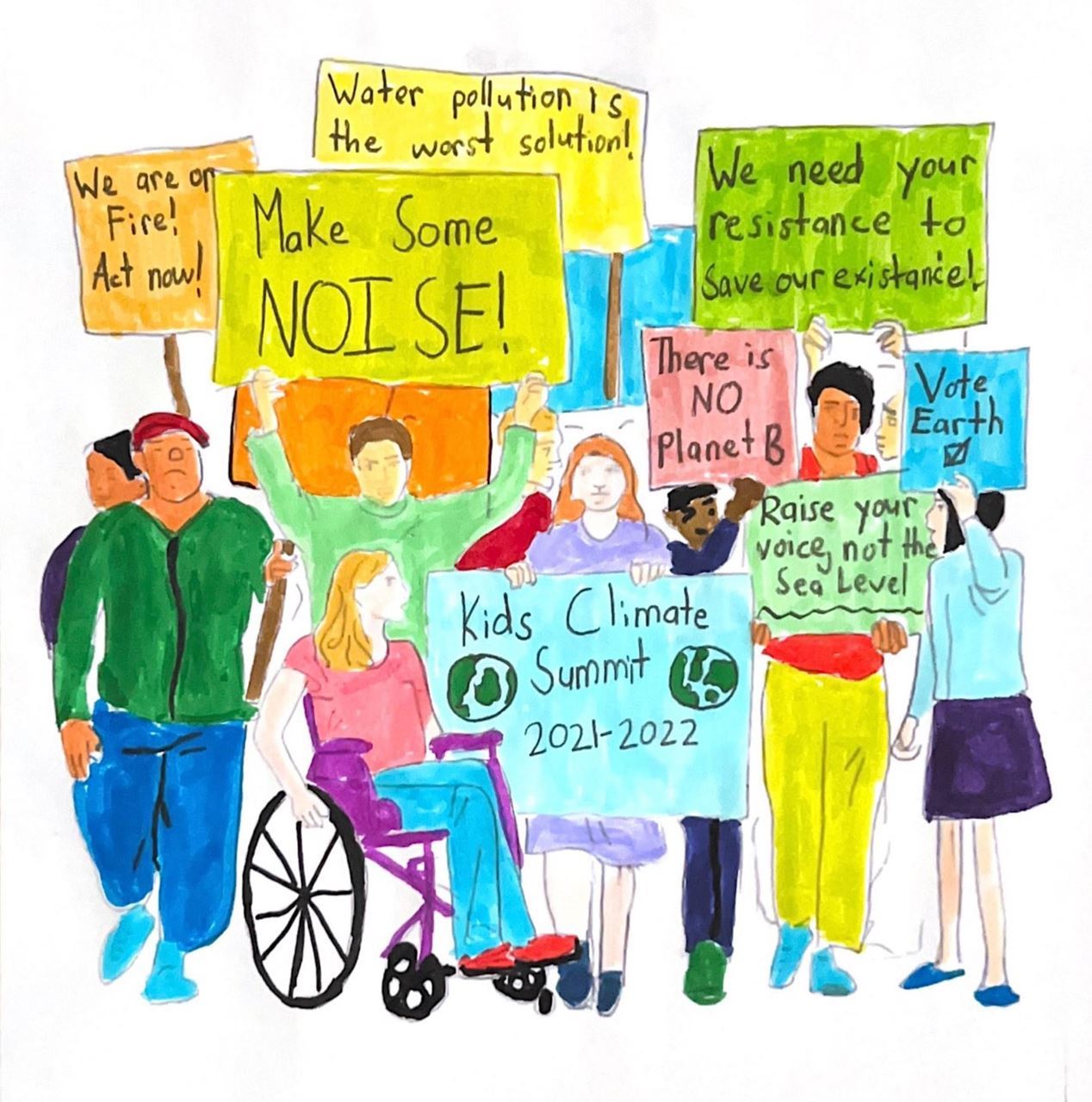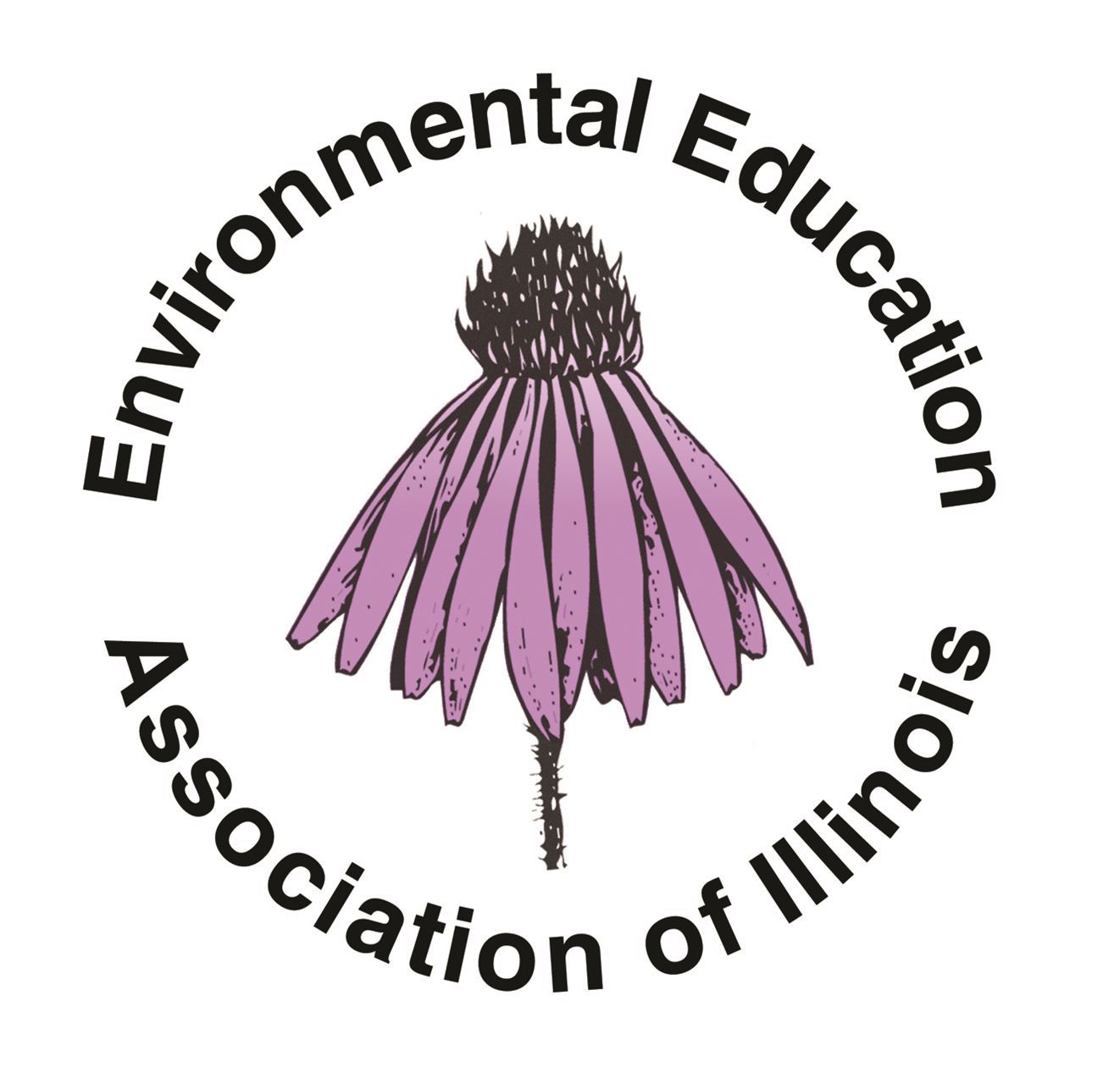- About
- Programs & Events
- Kids Climate Summit 2022
- KCS 2022 Page 3
Kids Climate Summit 2022: Make Some Noise!

While we were unable to host a Kids Climate Summit for 2022, the community still was able to MAKE SOME NOISE! We are excited to present the submissions to the Climate Change NOISE Challenges. Please enjoy these amazing works and we hope they inspire you to learn more about the climate.
There are 6 pages of submissions to be viewed: Page 1 - Alaina M., Roycemore Roots and Shoots Club, Linden P., Andrew M., Linda Wallin, Claire Bermaum, Mariana M., Inika Page 2 - Lyra R., Amelia R., Emilie B. Page 3 - Anika Chandola, Laxmiprasad, Anika B. Page 4 - Srinrsimha Katakam, Anisha K. Page 5 - Nora Berbaum, Kalyan Page 6 - Celsey O'hare, Brynne O'hare |
One Earth, One People, One Me When we were little we were educated on the vast extent of our earth That our resources limitless and our wildlife diverse But it has come to my attention things aren't as they seem With death all around us, what we believed… just a dream Today we hear of animals going extinct near and far At this rate of death, my child may never see a black jaguar But that's not the extent of our problem, oh no In time we´ll be gone, our earth covered in sand and snow With water running out and fires running ablaze My baby sister shouldn't fear if her father in Cali has more days We only have one earth and I fail to truly realize Why we squander all resources when we can embrace life´s prize In cities runs rampant air full of pollution and soot Costing the health of you and me for some corporation’s output Why im frustrated you ask, it's really not hard to see To let the choices of a few determine how life on earth will be It took me years to realize the monster we’ve created But I know the “we” of the future will not lose to man's greed but nourish and nurse new the earth we´ve awaited By: Anika Chandola | What does climate change mean to you? To me, climate change means huge destruction to the environment. There have been many environmental disasters that have occurred throughout the years such as pollution and wildfires. Many of these disasters were caused by lots of human activity, such as improper recycling of batteries. Did you know that 65% of the California Wildfires were caused by improper battery recycling? When batteries are thrown into the trash, they are shifted to landfills. At the landfills, the toxic chemicals from the battery release and combine with the soil to create explosions, soil, and water pollution - few of the reasons for climate change. Because of improper battery recycling and other human activity, there have been many effects of climate change. One of them is melting glaciers. The best source of fresh water comes from many reservoirs like lakes and rivers, including glaciers. However, out of all of the water in the planet, only 3% of them are drinking water, where 2% can be found from glaciers. If glaciers melt during warm weather, then all of the freshwater that it contains are gone. So climate change poses a great threat to our health and welfare. Because of the problems that climate change causes, it is better to conserve our resources, so that peoples' lives will never be affected. To get back to the battery situation again, with proper recycling of batteries, you can prevent pollution from happening and also be able to make the batteries into new items, so that they can be reusable. Plus, it can help restore the environment for future generations, so that this environmental stability can improve for centuries and centuries ahead. To sum it all up, this is what climate change means to me, as it is a way of ruining our resources and our life. by Laxmiprasad |
Why We Need to Address Climate Change Climate change is the permanent change in weather patterns and global temperatures. Burning fossil fuels like coal, oil, and gas results in greenhouse gas emissions. "Examples of greenhouse gas emissions that are causing climate change include carbon dioxide and methane. These come from using gasoline for driving a car or coal for heating a building" (What is Climate Change?). Greenhouse gases cause climate change by trapping heat in the atmosphere, which warms the planet, and if actions aren't taken greenhouse gas emission is expected to grow by 52% by 2050. The rapid burning of fossil fuels is not only bad for the environment but also for the economy. Experts predict that if fossil fuel usage continues at this rate nearly all fossil fuels will run out. "The global economy could lose 10% of its total economic value by 2050 due to climate change, according to new research" (This Is How Climate Change Could Impact the Global Economy). Climate change is also affecting the environment. Rising sea levels are another serious effect of climate change. In the past 25 years sea levels have risen by 3 inches which may not seem like a lot but by 2050 many scientists predict that sea levels will rise 15-25 inches. It is also predicted that many cities could be completely underwater including most parts of Florida and parts of Texas and Louisiana. Other aspects of climate change and global warming include rising temperatures, increases in heavy precipitation, and shrinking glaciers and melting polar ice caps. According to the World Wildlife Fund, "We lose Arctic sea ice at a rate of almost 13% per decade, and over the past 30 years, the oldest and thickest ice in the Arctic has declined by a stunning 95%" (Six Ways Loss of Arctic Ice Impacts Everyone). With less ice on the sea, several animals are suffering as well. Polar bears, walruses, reindeer, arctic foxes, and others have to adapt to this or they may slowly start to perish. But climate change affects more animals than just polar animals. Unless greenhouse gas emissions are reduced significantly, a quarter of all animals, birds, and plants will go extinct. Birds start to lay eggs and migrate earlier than they normally would. Many birds aren't even migrating towards warmer weather because the climate is suitable for them all year round. If sea levels rise another 20 inches sea turtles could lose their nesting beaches. Plants start to bloom earlier because they feel the weather is warm enough. Many animals come out of hibernation much earlier than normal. But climate change is also impacting humans. According to WHO (World Health Organization) "Climate change is the single biggest health threat facing humanity, and health professionals worldwide are already responding to the health harms caused by this unfolding crisis." (Climate Change and Health). Between 2030 and 2050, climate change is expected to cause approximately 250,000 additional deaths per year, from malnutrition, malaria, diarrhea, and heat stress. Countries with weaker health infrastructures will find it hard to cope without assistance to prepare and respond to the risks climate change imposes on our health. High greenhouse gas emissions cause air pollution which can deteriorate the human lungs and lead to severe illness and possible death. We must fight climate change to save our planet. Everyone can and needs to help in this battle. One major problem is carbon dioxide emission. Transportation is the largest source of carbon dioxide and greenhouse gas emissions. But luckily there are solutions. Using public transport more can significantly reduce greenhouse gas emissions. Public transport carries many people to their destinations at the same time instead of everyone using their own vehicle which would use much more gas. Going electric is another great solution. Many car manufacturers have an electric car model. Electric vehicles don't use gas which results in fewer gas emissions. Hybrid models are vehicles that use a combination of gas and electricity which is still less gas being used. Another major cause is electricity production. 25% of 2019 greenhouse gas emissions were caused by electric production. Most of the world's electricity is generated by fossil fuels like gas and coal. Some solutions are installing solar panels on your roof which generate electricity from the sun. There are many alternative strategies for generating electricity. Wind energy, solar power, geothermal energy, and hydropower are some of the most common renewable energy sources. In conclusion, it's important to understand how the climate is changing so that we can take action on it. If our government won't do anything about it then we have to. Understanding climate change can help us predict what will happen in the future so that we can take steps to ensure that our planet stays healthy and that future generations can grow up in a clean, safe environment. by Anika B. Works Cited “Car Emissions & Global Warming.” Union of Concerned Scientists, 18 July 2014, https://www.ucsusa.org/resources/car-emissions-global-warming. Accessed 7 January 2022. “Climate change and health.” WHO | World Health Organization, 30 October 2021, https://www.who.int/news-room/fact-sheets/detail/climate-change-and-health. Accessed 1 January 2022. “Climate Change - Effects on Animals.” Climate and Weather, https://www.climateandweather.net/global-warming/climate-change-and-animals/. Accessed 1 January 2022. “How Do We Reduce Greenhouse Gases? | Center for Science Education.” UCAR Center for Science Education, https://scied.ucar.edu/learning-zone/climate-solutions/reduce-greenhouse-gases. Accessed 7 January 2022. Knorr, Maite, and Abhishek Chinnappa. “How much will the sea level rise by 2050?” AS.com English, 10 November 2021, https://en.as.com/en/2021/11/10/latest_news/1636574794_250094.html. Accessed 7 January 2022. “Sources of Greenhouse Gas Emissions | US EPA.” US Environmental Protection Agency, 27 July 2021, https://www.epa.gov/ghgemissions/sources-greenhouse-gas-emissions. Accessed 7 January 2022. “This is How Climate Change Could Impact The Global Economy | World Economic Forum.” The World Economic Forum, 28 June 2021, https://www.weforum.org/agenda/2021/06/impact-climate-change-global-gdp/. Accessed 7 January 2022. “What are the effects of climate change?” My Climate, https://www.myclimate.org/information/faq/faq-detail/what-are-the-effects-of-climate-change/. Accessed 7 January 2022. “What Is Climate Change? | United Nations.” the United Nations, https://www.un.org/en/climatechange/what-is-climate-change. Accessed 1 January 2022. |







.jpg)





